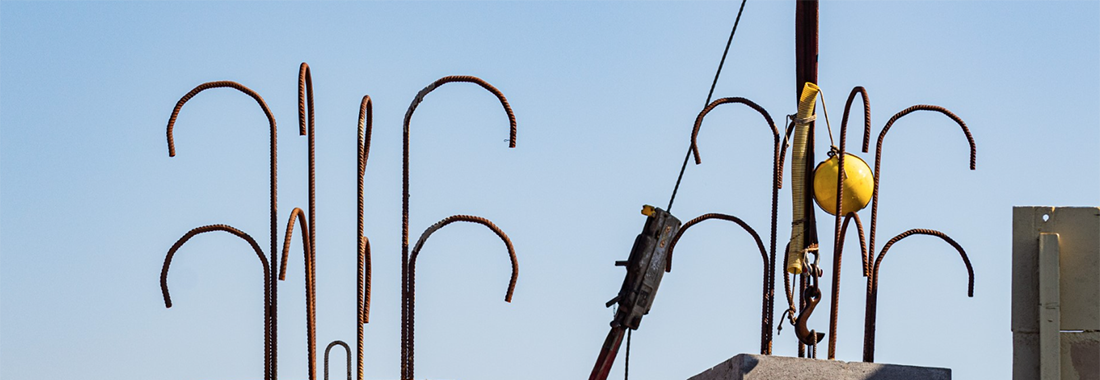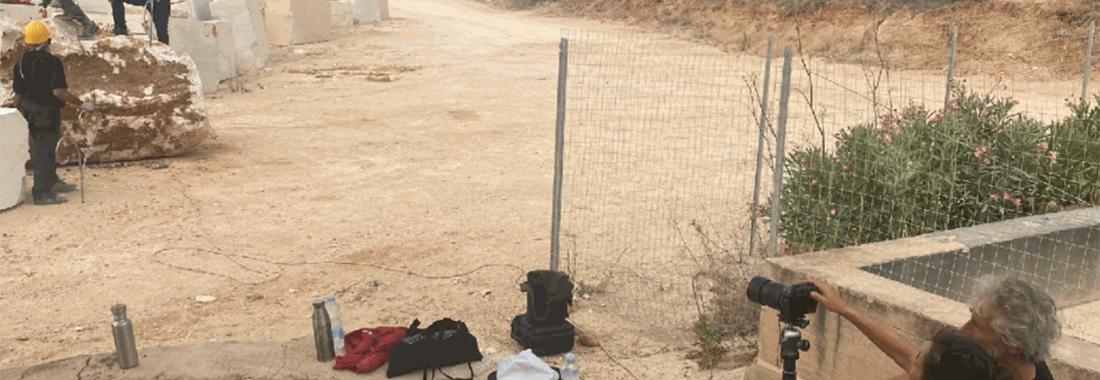MEDSEA is studying anti-trawling solutions derived from marble processing waste in Sardinia with the University of Cagliari - DICAAR Department as a natural continuation of the "Saturn" Anti-trawling Structures for the Natural Restoration and Protection of the Sinis Peninsula - Mal Di Ventre Island. At the beginning of the year, in the SATURN project in collaboration with the Flag Pescando Sardegna Occidentale, about sixty concrete anti trawling systems were placed off the Sinis Coast to inhibit illegal trawling and the advance of nets in the seabed.
This summer, thanks to the collaboration between the MEDSEA Foundation and the DICAAR of the University of Cagliari, circular economy solutions from the sea are being studied, directly from the marble quarries of Orosei of Sardegna Marmi. The project is called "Poseidone" and its aim is to defend the sea from illegal trawling in protected and sensitive areas, which is causing damage to the posidonia seagrass and seabed.
This millennial extraction activity in Sardinia has produced a considerable amount of waste, over 100 million cubic meters of natural building materials of excellent quality that remain unused. The use of materials from the local context and not alien offers the possibility to use them in sensitive areas for environmental protection. In Orosei, for example, for every cubic meter of marble extracted, 3 cubic meters of waste rock are produced. This waste is accumulated in a pile of over 3.5 million cubic meters, occupying an area of 16 hectares and with a height exceeding 20 meters, causing a significant landscape impact.
The anti-trawling structures made in this way use the residues of marble cultivation in Sardinia, protecting the posidonia, preserving the underwater landscape, and providing excellent support to marine organisms that colonize the interstices and cavities of the rocks. These structures are a refuge for many marine species.
"The advantages of local anti-trawling systems are also linked to the original lithology of the sea and the landscape context of the Gulf of Orosei, characterized by numerous boulders and limestone blocks resulting from the disintegration of the cliffs," explains Mauro Coni, project coordinator and representative of the Department of Civil, Environmental and Architecture Engineering.
"Trawling is a highly harmful practice for marine ecosystems - explains Alessio Satta, president of the MEDSEA Foundation - The nets dragged along the seabed remove and indiscriminately destroy every form of life they encounter along their path: fish, invertebrates, corals, algae and, in particular, the precious Posidonia oceanica. These nets, like a bulldozer, flatten and scrape the seabed, erasing every refuge for fauna and compromising the delicate balance of marine ecosystems. The result is a desolate and devastated environment, where the original biological communities struggle to reestablish, requiring long times and significant efforts for their regeneration. It is crucial to put an end to this destructive practice in order to preserve marine biodiversity and ensure a sustainable future for our seas."
Hence the idea of designing anti-trawling deterrents Made in Sardinia to use the waste rocks from the marble quarries. These rocks are equipped with slender flexible harpoons, specially designed to block the nets and release the cables of the boats in a controlled manner. Sardegna Marbles, thanks to its willingness to support the experimentation providing materials and logistics, has turned a quarry into a set for filming for a day, on the occasion of the visit of journalists from National Geographic who are working on a special.
Pics: DICAAR / Università degli studi di Cagliari
Latest news

TransformAr Open Day in Marceddì: Marshes and Lagoons to Reimagine the Future
Natural Solutions to Adapt to Climate Change: Lagoons and Marshes. This topic was discussed during an immersive walk between the Marceddì Lagoon and the San Giovanni Marsh on Friday, July…

MEDSEA joined the Natural Heritage Interreg Euro-MED Mission in Rovinj for aligning in projects' Communication
MEDSEA stopped in Rovinj, Croatia, from June 26th to 27th, 2024, to participate in the Communication, Amplification and Policy activities of the Interreg Euro-MED Natural Heritage mission, which brings together the thematic projects…

DesirMED: Nature-Based Solutions for Climate Adaptation, Regional Comparison at the Mid-Year Assembl
The DesirMED project recently held its General Assembly online on June 19 and 20 to review the progress of activities in the first semester. This meeting saw the participation of all scientific partners and…

Waste Hunt at Sella del Diavolo to Protect our Cetaceans Friends
Last Saturday on June 15th, nearly a ton of waste was recovered both on land and at sea during the "Puliamo la Sella!" event in Cagliari. The collected items included…

Active Restoration of Posidonia oceanica: MEDSEA at the 2024 World Seagrass Conference in Naples
MEDSEA continues to lead in the active restoration of Posidonia oceanica, a crucial topic for the conservation of Mediterranean marine ecosystems. Recently, the guide "Guidelines for the Active Restoration of Posidonia oceanica"

TransformAr Open Day on July 5th 2024: Discovering Transformative Solutions for Climate Change at the Marceddì Lagoon
On July 5th, TransformAr presents itself to the public with a special Open Day. The European Horizon 2020 project, aimed at developing transformative solutions for climate change adaptation, invites curious minds and citizens…

Puliamo la Sella! 2024 dedicated to our cetacean friends, with WWF, returns to Cagliari on June 15, 2024
The coastal cleanup organized by the MEDSEA Foundation, Puliamo la Sella!, returns to Cagliari on June 15th 2024. This year's event, now in its sixth edition, will be a special…

Deep Dive: The Talk for World Oceans Day
World Oceans Day provided an opportunity to reaffirm the importance of acting now to protect one of our most precious assets: the marine and coastal ecosystem. The Coalitions of the…
First SEG Meeting of the BLUE4ALL Project: A Focus on Surveillance and Biodiversity Protection
On May 23, 2024, the inaugural SEG (Stakeholder Engagement Group) meeting for the BLUE4ALL Project was held at Casa Todde in Villasimius, with options for remote participation.

RICREA introduces itself in Lucca, working on updating the Contracts, and will also focus on the Blue Crab
River, lagoon, and water body contracts in general are an exceptional tool for sustainable and participative environmental management, essential for the protection of water resources and local biodiversity. However, there…

TransformAr: Climate Adaptation Pathways Finalized for the Fisheries and Agriculture Sector in Terralba
This week, a participatory workshop was held in Terralba as part of the TransformAr project to finalise the adaptation pathways developed with local operators, particularly in the fisheries, agriculture, and biodiversity sectors.

ARTEMIS, Partner Meeting in Marseille to Kick Off Activities
On May 15th and 16th, at the Plan Bleu headquarters in Marseille, the first in-person meeting of the ARTEMIS project was held since the kickoff in March. ARTEMIS is a project within the…

DEEP DIVE: The Alarming State of the Ocean – Inspiring Action and Searching for Solutions (Webinar)
In celebration of World Ocean Day, MEDSEA invites you to the online event "Deep Dive: The Alarming State of the Ocean", a detailed analysis of the challenges that oceans are…

Fire Monitoring Test successfully conducted in Santu Lussurgiu thanks to IoT Technologies
At the end of April, a major breakthrough in fire prevention technology was achieved in the forests of San Leonardo. Thanks to pre-fire detection sensors, an IoT (Internet of Things) technology developed and…

REST COAST, at the annual meeting in Groningen, demonstrates the effectiveness of natural restoration of aquatic systems
The standstill of the Nature Restoration Law, the European law on nature restoration, stalled in its final approval phase in the Council due to the hesitations of some Member States, has…

TransformAr makes a stop in Finland for the sixth Consortium Meeting
In mid-April, the sixth Consortium meeting of the H2020 TransformAr Project was held in Lappeenranta, recognized as the Climate Capital of Finland. This city truly exemplifies sustainability, with 100% of waste recycled and all…
- 1
- 2
- 3
- 4


